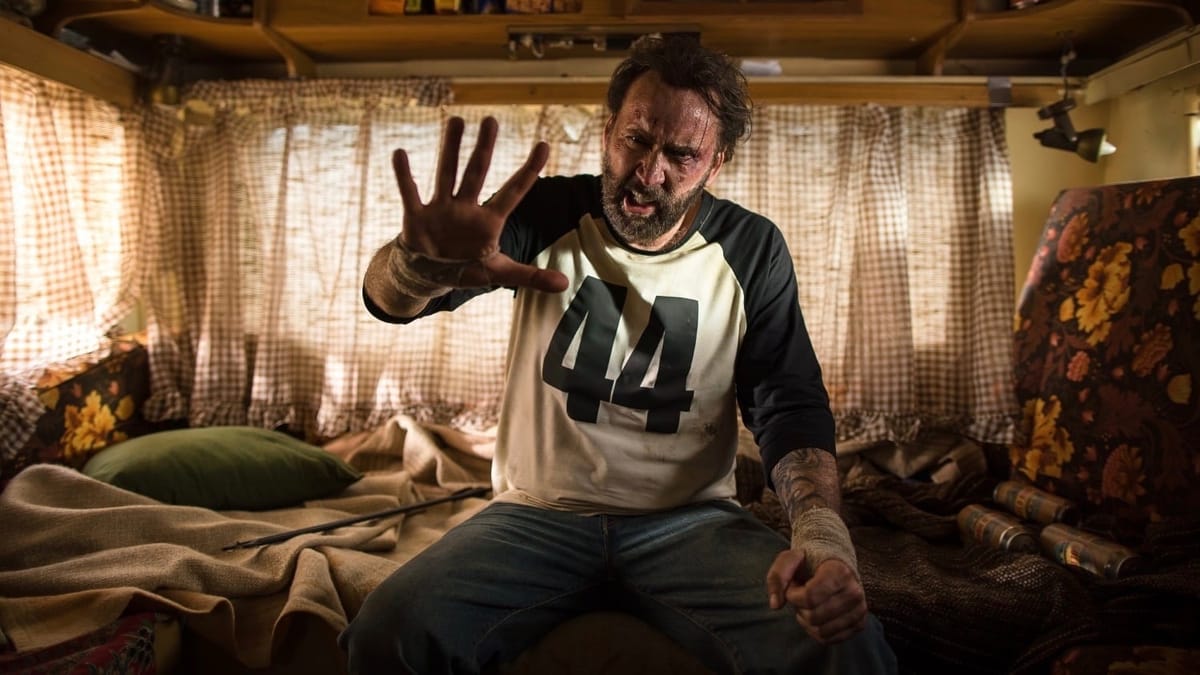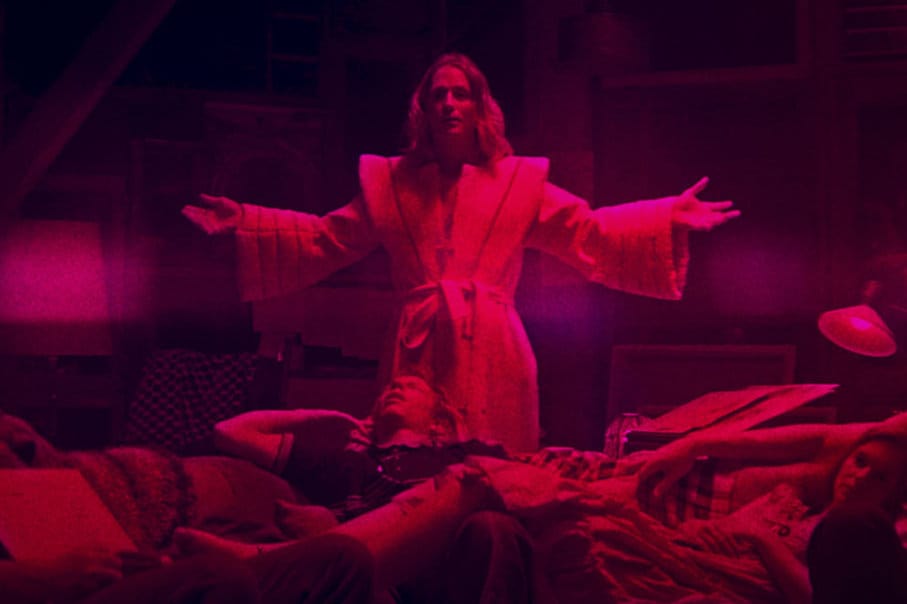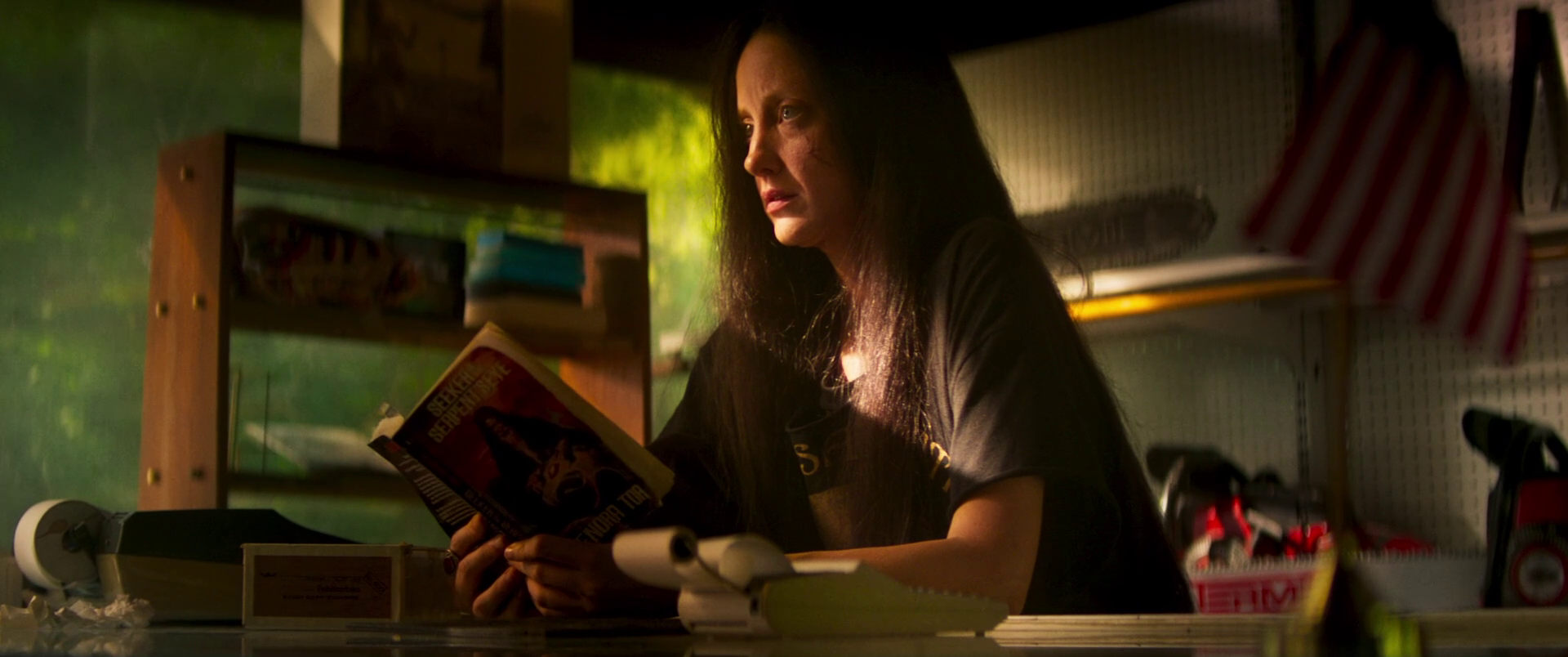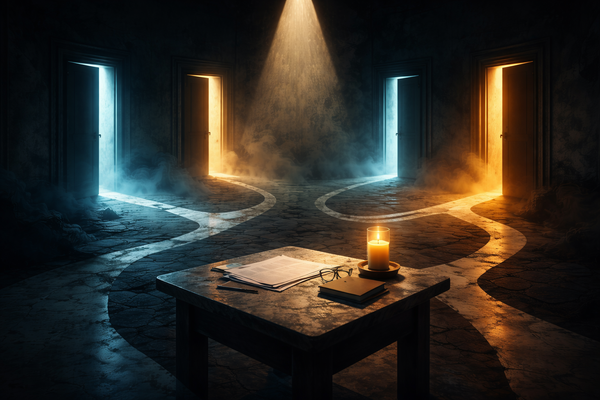Mandy and the Art of Growing Older Without Becoming a Cult Leader
What an acid-washed revenge movie taught me about aging, ego, and building a world worth living in

So, I finally got around to checking out the psychedelic, rage-fueled ride that is Mandy the other night. For those who've never seen this before, I'll give you the basic gist of what it's about. (Spoilers ahead, so consider yourself warned.)
Released in 2018, Mandy is perhaps best described as a heavy-metal fever dream in which Nicolas Cage goes full berserker after a hippie cult brutally murders the love of his life.
It’s soaked in lurid crimson light, pulsing with doom-metal guitars, and occasionally looks like someone filmed a mushroom trip through a bottle of cherry cough syrup. People get decapitated with boss-ass handmade axes. And there’s an evil folk singer turned cult leader, because of course, there is. There’s even a random tiger in an equally random cage for reasons never explained, and somehow it all works.
But underneath the chainsaws and cosmic lighting, Mandy is a parable about age, loss, and what you do when the world no longer has a place for you (if it ever did).
For that reason, I'm almost certain I processed this a lot differently at nearly 50 than I ever would have when it first came out. Back then, I likely would have just admired the visuals, the stellar acting, and the awesomely unhinged dialogue. But watching it now, I kept thinking, "Hold up, I know these people" (minus the tiger and the cult).
The Prophet and the Lumberjack
At first glance, Red Miller (Cage) and Jeremiah Sand (Linus Roache) honestly don't seem to have very much in common. One is a quiet lumberjack who loves his girlfriend, Mandy (Andrea Riseborough), and their epic view of the woods from their cabin. The other is a self-proclaimed messiah with crazy eyes, a cult, and a serial killer van.
But they’re also roughly the same age, and after some thought, I've realized that matters.
Both are men in the thick of middle age in the 1980s, the decade that left the fabled idealism of the ’60s and ’70s in the rearview. At some point, Jeremiah released a folk-rock record that flopped and has apparently been trying to cope with that ever since. Red, meanwhile, has simply accepted that he’s ordinary and found peace in it.
Where Jeremiah builds a cult to deny his flawed humanity (and the passage of time), Red builds a life that doesn’t actually need an audience. Mandy has done something similar, working as a gas station attendant by day and making bomb-ass fantasy art by night. She also possesses the type of purity and inner light Jeremiah only thinks he has.
When Jeremiah first spots Mandy walking to work one day, he decides she’s “the one.” Not in a normal "I'd like to meet you" kind of way, but the way narcissists mean it. "You’re my reflection, and you will validate me."
So, what does he do about it?
He sends his lackeys to kidnap her, drugs her, and tries to impress her with his music (which he apparently wrote about himself, so the cringe is truly real). She laughs her ass off, because what else can you do in that situation when you're already high as balls? And that's just it. From there, the prophet’s whole theology collapses over one woman chuckling at his record.
For all intents and purposes, Mandy's laughter cracks the universe open. Jeremiah’s ego can’t survive ridicule, so he sets fire (literally) to poor Mandy, right in front of Red. The rest of the film is Red descending into literal hell to avenge her— chainsaw duels, demon bikers, the works. But underneath it all is a much simpler, more relatable horror — what happens when a man refuses to age with grace.

The Cult of Denial
Jeremiah’s followers are fascinating in their own right. The vast majority of them aren't bright-eyed, bushy-tailed youth. They’re also aging hippies whose communes turned to dust a very long time ago.
Brother Swan is Jeremiah's scar-faced right-hand man. White-haired Sister Marlene seems like she was probably the favorite until Jeremiah traded her for someone younger. Sister Lucy is that much-younger disciple and might even be pregnant (I couldn't tell if it was just her dress or not), a literal symbol of Jeremiah's obsession with renewal. And there are others, as well, including a drug genius known only as "the chemist."
It’s this whole fragile ecosystem built on pretending the ’60s never ended, as well as the idea that Jeremiah is some kind of god or chosen one.
I actually felt sort of bad for the disciples at first. You can almost see the better people they might have been — artists, seekers, idealists — if they’d chosen to accept reality and let time teach them instead of embracing kidnapping and murder.
By the end, they’re living in a filthy cave Jeremiah calls “what God has provided,” which was actually pretty unintentionally funny. “Look what God has provided?” It’s a hole in the ground, bruh. Congratulations on your cave mortgage.
That cave is Jeremiah’s mind turned inside out. You can smell the metaphor from space.
Processing Mandy at 50
When I was younger, I probably would’ve seen Mandy simply as an artsy revenge flick, featuring Cage doing what Cage does best. But watching it now, it feels like a meditation on aging artists and what happens when the world you prepared for goes extinct (or maybe fails to materialize in the first place).
Jeremiah is what you become if you can’t let go of the idea that your big break just wasn't in the cards and that you're honestly not as special as you think you are. He’s the version of the creative self that refuses humility, and he ultimately makes it Mandy's problem.
But Red (at least before Mandy's death) is what you become if you accept smaller miracles — a quiet life, love, your own rhythm. Later on, he arguably becomes the transcendent god Jeremiah wanted to think he was, but only through grief, hardship, and perseverance.
I’ve known both kinds of people.
I've unfortunately even had Walmart versions of Jeremiah approach me on the internet with love poems and grand declarations of cosmic destiny. Sometimes there's even that “I recognize you” line, as if recognition is ownership. Ultimately, it’s the same motivation at the core of it, though:
I will step into your life and rewrite it around me.
In Mandy, it ends with fire. In real life, stuff like that (hopefully) ends with blocked accounts and maybe a restraining order.
But I'm not entirely oblivious to the other side of things, either — the fear of becoming irrelevant and the temptation to simply demand that the world notice what it overlooked in you. I get badly wanting to matter. But mattering and being worshiped aren’t the same thing.

Rebuilding the World After Collapse
Mandy and Red’s little cabin in the woods is a genuine micro-universe — ordinary but comfortable, powered by books, art, and conversations about planets. Jeremiah’s cult is the counterfeit version — a world held together by denial and super-LSD. Both are responses to the same wound:
There’s no room for us out there.
Sooner or later, we all reach a point where the larger system — the job market, the art scene, whatever — stops caring, if it ever did in the first place. You can either chase relevance until you rot, or you can get comfortable in your own skin and build a new world around that.
Red and Mandy’s approach was the healthier model. Instead of seeking approval, they make beauty where they stand. Your version of that might be a garden, a creative project, or just refusing to surrender your weirdness. Every time we choose authenticity over applause, we are doing what Jeremiah couldn’t.
Transcendence by Chainsaw (and Grief)
After the slaying of Mandy, Red’s revenge tour looks, on the surface, like the world’s goriest therapy session, Cheddar goblins and all. But beneath all the screaming and the blood, it’s a weirdly spiritual metamorphosis — a kind of crucible through grief.
The film never softens his pain, and I really respect that about it. There’s no “healing montage.” Just shock, tears, and that now-iconic rampage through every layer of hell. By the end, Red is no longer human in a way most of us recognize, but one could make the argument that he’s quite possibly more himself than he’s ever been — Red 2.0.
Jeremiah spends the film trying to ascend through worship-mongering and LSD, but Red transcends by going down instead. Down into the earth, the pit, the cave. Down through every layer of agony until there’s honestly nothing left to lose. The cave where he kills Jeremiah isn’t just hell. It’s the rock bottom of Red's grief, the place where you either die or see clearly for the first time.
Red's final smile as he drives away from all the madness is haunting. He’s soaked in blood, hallucinating Mandy beside him, and yet… he is also luminous. There’s a terrible, hard-won peace there, and now the world around him is different — mythic and weirdly epic, like the fantasy worlds in Mandy's books and paintings.
At that point, the man who cut trees to make a living now is the forest. He is untamed, alive, and eternal.
Mandy never quite labels the final state Red reaches. It does remind us that transcendence doesn’t necessarily look like holy light pouring from the sky and angels singing. Sometimes it’s just in the way you keep moving, even when the world around you has turned to ash.





